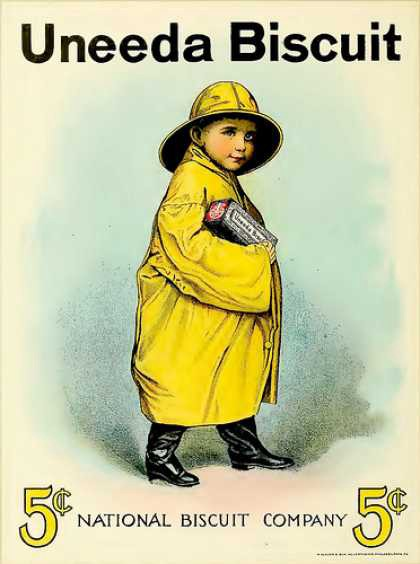Josh Gross
Do you remember as a kid going to the grocery store with your parents and being just totally overwhelmed by the bright, loud packaging of products on shelf after shelf, aisle after aisle?
I certainly do. Each product had a brand — you’d recognize the Kix by its bright red box and Tide by its loud orange bottle. Every package screamed its brand name at you.
Branded packaging as we know it hasn’t been around that long. While people have been packaging goods for millennia, trademarked printed boxes, tins and shrink-wrapped containers were only invented in the late 1800s — less than 150 years ago, beginning with Uneeda Biscuits around 1896.
When branded packaging was invented, and up until very recently, its purpose and value to nearly every industry made a ton of good sense. The average consumer would shop in a catalog, browsing ads and offerings, or in a store, perusing shelves of products. The more a product stood out and set itself apart, the more memorable it would be and the more likely it would be purchased. Good packaging made products easy to recommend and spread by sharing visually.

And then, the internet came along.
Our team recently launched our new studio product, Regular, a service directed at small businesses hitting their growth inflection point. As we began to design our own website and work on branding, we did a lot of research into branding trends for consumer packaged goods, and what we uncovered was surprising.
We found was that there is a surprising movement towards “unbranding” — specifically choosing not to create a strong association between a product and its maker. Instead of bright packaging, large logos and stamped products, many companies are now going the other direction by operating without logos and offering minimal (or no) packaging.

One of the earliest companies to adopt this mindset was Japanese home goods store MUJI, whose name literally means “No Brand” (it doesn’t get more literal than that). Most of its products come unpackaged with just a small price tag, or in minimal packaging with a single informational label (e.g., “lotion,” “body soap”) to identify its contents.
But MUJI has been since the 1980s, so why are we talking about this now?
While this trend has been around for a while, it has finally started to gain real steam; this year, MUJI opened a hotel. Loblaw Industries launched no.name, a line of products that uses only yellow and black packaging with a simple label indicating the product’s contents (“walnuts” are just walnuts, “peanut butter” is just peanut butter) started its biggest advertising push ever this year.
With younger (35 and under) consumers experiencing decision and advertising fatigue, even companies like Doritos have gotten into the game; their recent ad campaign never mentions their brand name.
In the U.S., you have the very literal Brandless company for day-to-day needs (which just raised another $240M this year) and a newcomer to the market, Move, which is all about generically packaged best-of-choice supermarket goods.
What inspired this trend to really start gaining traction? More than 68% of people in the U.S. have bought something online at least once, and that number is rising. As the population of online shoppers and the global market for goods continues to expand, the number of products available that effectively do the same exact thing has exploded, leaving shoppers with a real case of the paradox of choice — the more options, the more difficult it is to choose one.
Many buyers are overwhelmed: with so many similar products, which is the best one for their needs? And who has the time to evaluate every single product? Buying a bathmat shouldn’t require hours of review-reading and a pros and cons table.
Traditionally, the answer to that problem has been services and companies that evaluate, test and review products. From one of the earliest, Consumer Reports (established way back in 1936), to Wirecutter (established 2011), to the nearly endless stream of YouTube product reviewers, there’s an in-depth evaluation for products in nearly every category.
Wirecutter’s search box cuts right to the chase: users look up a particular type of product, read a review and evaluation and are encouraged to purchase the best product for their budget. This model still works pretty well — as long as you rely on a trustworthy source — which may be hard to identify — you’ve typically been able to find the right version of the product you want.
In the past few years, however, we’ve seen a flood of products from China, many from brands we’ve never heard of, often drop-shipped white-label products. It certainly doesn’t help that fake, paid-for product reviews are running rampant. Ultimately, this has boosted the paradox of choice to an untenable level for many consumers.
As a response, we’ve now entered a period I describe as “The Unbrandening.”
Companies are turning about-face by offering “one good thing.” With companies like MUJI, no name, Move, and even Amazon’s Basics line, each product is evaluated and selected as the one-and-only of the type they sell; these companies are designing an experience that takes contemplation and consideration out of the equation. Need shampoo? Buy Shampoo. Looking for a white t-shirt? Buy this White T-Shirt. There’s one option; you buy it, and it’ll do the job well. End of story.
While it’s difficult to say what this will mean for branded packaging in the long term, it’s not the death of branding. However, it is a true sea change in the way that companies advertise products to consumers and how consumers purchase products — especially widely available basic goods like groceries, household goods and clothing essentials. Even our product, Regular, is a response to the need for “one good thing,” in this case, small business websites.
Over the next few years, the market will likely see this sector of ‘unbranded’ goods continue to grow, with different companies vying to become leaders of a corner of the market, like basic home goods, groceries, clothing and basic furniture (though IKEA has a pretty strong hold in that market). It will be interesting to see what this means and if companies ultimately re-fragment, or continue to consolidate as consumers demand simpler and easier choices.































Comment